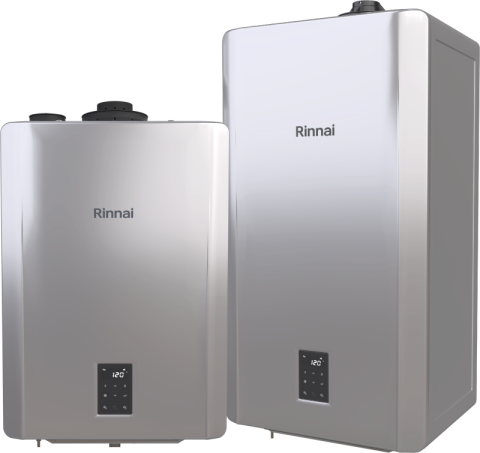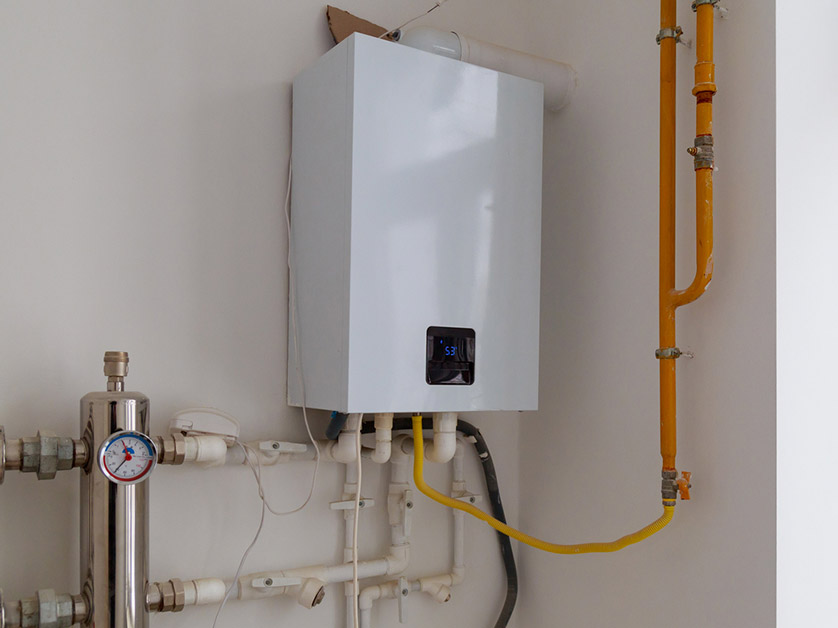Exploring The Upsides Of Tankless Water Heaters
Exploring The Upsides Of Tankless Water Heaters
Blog Article
Just how do you really feel in relation to 5 Benefits of Tankless Water Heaters?

In a world where comfort and efficiency reign supreme, it's not a surprise that homeowners are continuously in search of smarter ways to handle their home's energy intake and convenience. One technology that has actually steadily obtained appeal is the tankless hot water heater. But exactly what makes these systems attract attention from the conventional tank-based designs a lot of us matured with? Allow's dive in and discover the benefits of tankless hot water heater, helping you choose if it's time to make the switch in your house.
Intro
Image this: you enter the shower after a lengthy day, expecting a relaxing cascade of hot water, only to be greeted by icy beads since the last individual used everything up. Sound familiar? Typical hot water heater store a set quantity of warm water, indicating you're at the grace of that storage tank's supply. Tankless systems, on the other hand, warmth water on demand. Say goodbye to running out mid-shower, no more fumbling with routines just to make certain warm water is readily available.
Understanding Tankless Hot Water Heater
What Are Tankless Water Heaters?
Tankless water heaters, sometimes referred to as on-demand or immediate hot water heater, provide hot water just as it's needed. Instead of storing gallons of pre-heated water, these systems kick into action the moment you activate the tap. Water passes through a warmth exchanger, warming up in real-time, suggesting you get an undisturbed circulation of warm water without the demand for a large container resting lazily by.
How Do They Differ from Standard Equipments?
Typical heating systems hold a tank of warm water, utilizing energy to maintain that container at a regular temperature. Tankless systems eliminate the standing supply, cutting down on squandered power and the large footprint of a big cylinder. Essentially, you're upgrading from a "accumulation" state of mind to a "made-to-order" technique.
Typical Sorts Of Tankless Devices
Tankless hot water heater usually are available in two varieties: gas and electric. Gas versions tend to provide greater circulation prices, suitable for bigger families, while electric designs frequently offer smaller sized homes and are normally much easier to set up. Furthermore, some systems are designed for point-of-use (serving one fixture) while others can deal with the entire home's hot water demands.
Trick Benefits of Tankless Hot Water Heater
Energy Performance and Expense Savings
No more heating a titan storage tank's worth of water and keeping it warm all the time. Tankless heaters minimize standby energy losses, which can lower utility bills. While the preliminary cost could be higher, the long-term cost savings typically warrant the financial investment.
3. Space-Saving Design
If your home is short on storage, eliminating the large container liberates beneficial area. Tankless systems are compact and can commonly be placed on walls, stashed in edges, or installed in tight energy storage rooms without monopolizing the entire area.
4. Longer Life-span
A properly maintained tankless water heater can outlive its tank-based relative. Standard tanks could last 10-15 years, while tankless models can maintain downing along for two decades or even more, making them a solid investment over time.
1. Limitless Warm Water Supply
Ever had to set up showers so everyone gets their reasonable share of warm water? With tankless, that comes to be a thing of the past. As long as the heating system's circulation ability isn't exceeded, you can take back-to-back showers without turning into a popsicle.
5. Improved Water Quality
Storing water in a tank can occasionally bring about debris accumulation or a slightly "off" taste. With tankless systems, fresh water is heated up instantly, decreasing the chances of debris build-up and possibly supplying cleaner-tasting water.
Considerations Before Changing
Though the benefits are engaging, it's wise to consider a couple of aspects before completely committing.
Examining Your Home's Water Use Patterns
If your house all at once utilizes multiple components with high hot water demand, ensure the device's circulation rate fulfills your needs. Knowing your usage patterns helps you select the right size and type of tankless heating unit.
Maintenance and Care Tips
Tankless systems are fairly reduced upkeep, however they aren't set-it-and-forget-it appliances.
Routine Cleansing and Descaling
Difficult water minerals can build up in the warm exchanger, influencing efficiency. Routine descaling (frequently suggested every year) maintains the unit running at peak performance.
Annual Expert Examinations
A yearly checkup from a professional makes certain small concerns are caught early. They'll evaluate the unit's efficiency, seek leaks, and assist preserve optimum efficiency.
Initial Investment Prices
Tankless heating units commonly feature a greater in advance price. Between the system itself and prospective installation alterations, the first cost could give you sticker label shock. However remember to watch it as a long-lasting investment.
Setup Demands
Depending on your home's framework, you might require added electric capacity or gas line upgrades. Guarantee you recognize the installment requirements and talk to a specialist to stay clear of shocks.
Ensuring Proper Ventilation
For gas designs, appropriate ventilation is vital to safely expel exhaust gases. Make certain airing vent systems are tidy and properly mounted to avoid any kind of prospective safety and security risks.
Comparing Different Brands and Designs
Not all tankless hot water heater are produced equal.
Investigating Trusted Suppliers
Try to find trustworthy brand names with a history of producing top quality systems. A reputable maker commonly offers far better client support and longer service warranties.
Installation: DIY or Expert?
While some property owners relish dealing with tasks themselves, tankless setup might not be the most effective time to break out the tool kit.
Pros and Cons of DIY Setup
A DIY set up could conserve money, but it includes risks. Incorrect installment can lead to inadequacy or safety issues. If you come in handy and have experience, it could be practical-- but proceed with caution.
Reading Evaluations and Individual Comments
Individual evaluations and comments from neighbors or friends that have actually gone tankless can use important insights. In some cases, real-life experiences can be more telling than marketing sales brochures.
When to Call an Expert Plumbing Technician
For many, calling a professional makes sure whatever's done correctly. A specialist plumbing recognizes local codes, sizing demands, and airing vent parameters, decreasing the threat of mishaps.
Making best use of Efficiency
You've purchased a tankless system-- currently maximize its performance.
Ideal Temperature Settings
Most people establish their systems between 120-140 F. Adjusting the temperature can boost comfort and cost savings. Experiment to locate a pleasant place that doesn't waste energy.
Coupling With Low-Flow Fixtures
Intend to stretch your system's capacities? Consider setting up low-flow showerheads and taps. They lower water usage, allowing your tankless system to deliver a steady stream of hot water without stressing.
Ecological Effect
Tankless water heaters line up with greener living goals.
Decreased Carbon Footprint
By utilizing much less energy and only home heating water as required, tankless systems can reduce your home's carbon footprint, lowering your ecological impact.
Preserving Natural Resources
Less power usage and much less squandered warm water translate right into fewer natural resources being made use of, an environmental win-win.
That Profits The Majority Of from Tankless Heaters?
The elegance of tankless heaters is that they can suit a range of homes.
Large Family Members vs. Solitary Owners
Big family members might love the countless hot water supply, while solitary occupants appreciate the energy financial savings from not heating an entire container for simply a single person's morning shower.
House Owners with Limited Space
If your home is short on square video, shedding the large storage tank frees up area for various other essentials-- or perhaps just extra breathing space.
Eco-Conscious Customers
Going tankless aligns with eco-friendly worths, ensuring you're not losing power or sources.
Future Patterns in Tankless Hot Water Heater
The globe of home devices is ever-evolving, and tankless hot water heater are no exemption.
Advancements in Technology
R&D is frequently boosting warmth exchangers, making systems more efficient and resilient. Future designs may be even quieter, much more compact, and much better matched for varying environments.
Smart Home Integration
Visualize adjusting your water heater's temperature level through an app or getting upkeep signals on your phone. As clever home technology advancements, we'll see even more connectivity and benefit.
Conclusion
Selecting a tankless water heater is greater than just upgrading your home's hot water system; it's investing in long-term convenience, power effectiveness, and a greener way of living. By considering your household's water usage, bearing in mind setup needs, and committing to routine upkeep, you can delight in a consistent stream of warm water without the baggage of a large container. As innovation advances, you can eagerly anticipate even smarter, extra reliable tankless options that not just make your life simpler but likewise benefit the earth.
Why You Should Consider a Tankless Water Heater for Your Home
Energy Efficiency and Cost Savings
Tankless water heaters, also known as on-demand water heaters, heat water only when needed. This means they don't waste energy keeping a tank of water hot constantly. This efficiency translates into substantial cost savings on your monthly energy bills.
Endless Hot Water Supply
One of the significant advantages of tankless water heaters is their ability to provide a continuous supply of hot water. Traditional tank water heaters have a limited capacity and can run out of hot water, especially during peak usage times. In contrast, tankless water heaters can provide an endless stream of hot water, making them ideal for larger families or homes with high water usage.
Space-Saving Design
Tankless water heaters are compact and take up significantly less space compared to traditional tank heaters. They can be installed on walls, under cabinets, or even outside, freeing up valuable space in your home. This makes tankless water heaters a great option for smaller homes or properties with limited space for a traditional water heater.
Longer Lifespan and Lower Maintenance
Tankless water heaters typically have a longer lifespan compared to traditional tank heaters. They can last up to 20 years or more with proper maintenance. Additionally, tankless systems are designed with replaceable parts, which can extend their lifespan further and reduce long-term maintenance costs.
Environmentally Friendly
Reducing energy consumption not only saves you money but also benefits the environment. Tankless water heaters contribute to a smaller carbon footprint by using less energy to heat water. Their energy efficiency and ability to minimize standby heat loss make them an eco-friendly choice for environmentally conscious homeowners.
Customized Temperature Control
Tankless water heaters offer precise temperature control, allowing you to set the desired temperature to meet your specific needs. This level of customization ensures you always have water at the perfect temperature for your comfort and usage requirements.
https://beantownservices.com/blog/consider-tankless-water-heater-for-your-home

I am very serious about and I hope you liked our blog posting. Appreciated our write up? Please share it. Help other people locate it. Many thanks for being here. Don't hesitate to check our site back soon.
Call Today Report this page